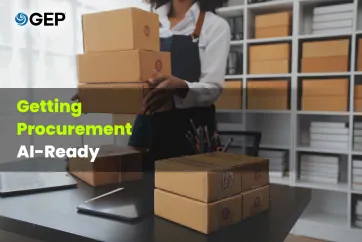
Struggling to Fully Utilize Contracts? Get AI-Powered Vendor Contract Management Software
- There are usually large gaps in creating and implementing vendor contracts.
- Contract management software fills these gaps, automates workflows and delivers enterprise-wide contract intelligence.
- It ensures people utilize contracts and make the most of negotiated terms and conditions.
October 08, 2025 | Procurement Software 4 minutes read
The admin executive of a manufacturing company purchases miscellaneous stationery from different vendors, not knowing that his organization has an active contract with a vendor. Not only does he pay extra to buy these goods, but he also misses out on lucrative discounts with the contracted vendor.
Over time, these stationery bills add up, costing his company much more than routine purchases.
Like the above example, internal business teams often make purchases outside contracts. At times, they aren’t even aware they have a contract in place and miss out on potential savings. Or they think that the set process is complicated, and it’s better to buy on the spot. They bypass contracts and formal buying procedures. How can enterprises prevent this and ensure that teams buy from contracted vendors? How can they effectively manage vendor contracts? And how do they check if vendors are meeting their contractual requirements?
Let’s start with a basic question. Why do businesses enter into contracts with vendors?
All businesses, big and small, need to procure goods and services from vendors in routine operations. They want to ensure that they buy high-quality goods and services at the most affordable prices. In this endeavor, they need a framework to outline the key objectives of their agreement with vendors. And they also need to engage in regular performance evaluation over time.
Do Your Internal Business Teams Often Buy Outside Contracts?
Help them buy from approved vendors and contracts
To meet all these requirements, businesses make formal agreements with their vendors.
What is Vendor Contract Management?
Vendor contract management involves creating, executing, analyzing, and monitoring contracts with vendors. It spans across the entire life cycle of vendor contracts, from initial negotiation and creation through performance management and renewal or termination. It also involves ongoing analysis of contract data to improve vendor performance.
Teams can engage in strategic negotiations and contract renewals to secure favorable terms. Another key objective of vendor contract management is to minimize potential risks and uncertainties.
Improved transparency and communication help build long-term partnerships with vendors.
Why Businesses Need Vendor Contract Management
Often, there are a lot of gaps between creating contracts and effectively managing them. Traditionally, companies relied on time-consuming paperwork for creating and managing contracts. In this approach, contracts are signed, filed and often forgotten, says Paul Blake, senior director at GEP.
Lack of transparency means that vendor contracts remain merely on paper as relevant internal teams do not even use these contracts. The signing and creation of a contract is not the end goal of procurement, says Blake. Instead, contract creation is a step in the larger source-to-pay process, he adds. What’s more important is how teams utilize the contract and benefit from its terms and conditions. Today, many companies leverage contract management software for end-to-end contract life cycle management. Advanced technology not only automates contract management, but it also delivers enterprise-wide contract intelligence. It seamlessly connects procurement, legal, sales, and other stakeholders across the contract life cycle.
AI Can Drive More Value From Your Contracts
Transform Contract Management with an AI-Driven CLM Solution
How Vendor Contract Management Software Helps
Vendor contract management software centralizes contract storage, automates workflows and provides visibility into performance. It transforms static legal documents into dynamic business tools that improve decision-making and build trust between businesses and their vendors.
Automated workflows:
Automate contract creation, review, approval and renewal, streamline workflows and reduce manual work.
Better collaboration:
Work with vendors on contract authoring, through features such as collaborative editing, access control and side-by-side comparison. Speed up the contract authoring process with best-practice contract templates and digital signatures.
Contract visibility:
Track contract performance and get enterprise-wide contract intelligence across categories and regions. See which contracts are performing well and which ones need close monitoring.
Contract repository:
Store all contracts in a centralized, web-based contract repository. Use free text and string search to access any contract-related information from any device.
Compliance tracking:
Monitor vendor performance against contractual obligations, tracking key metrics and milestones. Track delivery dates, quality standards, pricing, and other contractual requirements. Use automated alerts to flag deadlines or potential compliance issues.
Improved security:
Leverage advanced security features to protect sensitive contract information. Restrict access to authorized personnel and reduce the risk of data breach.
Let Technology Do All the Heavy Lifting
There is little doubt that vendor contract management software is now a must-have for sourcing and procurement teams. Not only does it simplify the creation, review and management of vendor contracts, but also allows teams to gather useful data insights and build strong vendor relationships.
This transforms vendor management into a strategic business unit that can do more with less and add more value. And yes, it allows people to buy with the same ease as they would outside the contract.



